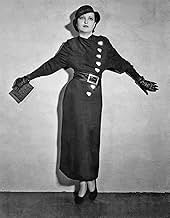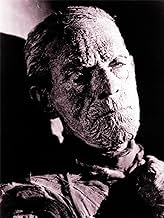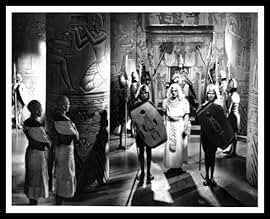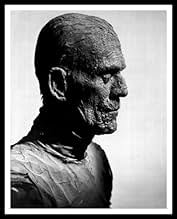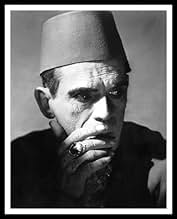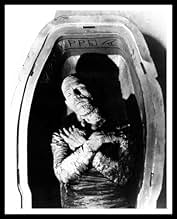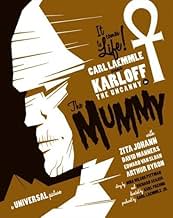IMDb RATING
7.0/10
32K
YOUR RATING
A resurrected Egyptian mummy searches Cairo for the girl he believes to be his long-lost princess.A resurrected Egyptian mummy searches Cairo for the girl he believes to be his long-lost princess.A resurrected Egyptian mummy searches Cairo for the girl he believes to be his long-lost princess.
- Director
- Writers
- Stars
- Awards
- 1 win & 4 nominations total
Henry Victor
- The Saxon Warrior
- (scenes deleted)
Arnold Gray
- Knight
- (scenes deleted)
Florence Britton
- Nurse
- (uncredited)
Jack Deery
- Party Guest
- (uncredited)
Bill Elliott
- Party Guest
- (uncredited)
Leyland Hodgson
- Gentleman #2 at Cairo Party
- (uncredited)
Eddie Kane
- Inspector's Assistant
- (uncredited)
Tony Marlow
- Police Inspector
- (uncredited)
- Director
- Writers
- All cast & crew
- Production, box office & more at IMDbPro
Featured reviews
What director Karl Freund achieves in this movie is nothing short of staggering, even at a remove of nearly 70 years. If this same story, with this same basic approach, were released today, it would still be great. And especially now, when the box office successes of such movies as The Sixth Sense, What Lies Beneath and The Blair Witch Project demonstrate that audiences are hungry for a return to the classic horror virtues of style, mood and suspense (as opposed to the tired formula of gore, in your face shocks, special effects, and more gore) The Mummy would seem ripe for some kind of revival (too bad the lame Brendan Fraser vehicle has stolen its title - though nothing of its wit, skill, or conviction).
What makes this movie so good is. . . gosh, there are so many things! Start with the creepy and unsettling tone, which the movie establishes right away. The very first scene - where the Mummy is awakened - is one of the greatest ever for pure atmosphere and chills. Look at the way Freund *under* plays it, every step of the way. Instead of piling on a crescendo of "scary" music and using odd or distorted camera angles to dramatize the situation, he has the action play out in total silence and with a resolutely still camera, the tasteful cut-aways (from the mummy in the tomb to the archaeologist sitting not five feet away) being the only frill. The tension which results is unsettlingly powerful - and is made moreso by the fact that the scene refuses to resolve itself in the way which we expect it to. I'll give no more details, but when you watch the film, ask yourself: isn't *this* resolution ten times more creepy and effective than the one we thought we saw coming. Already, five minutes in, it's clear that The Mummy has a far more wicked, sophisticated sense of horror than any of the other big "monsters" of the day (Dracula, Frankenstein, Wolf Man, etc.) - and a good deal more than many that have come after, too.
But of course, all the style in the world ultimately cannot save a weak or hackneyed script. And so it's a great pleasure to report that all of Freund's technical finesse is at the service of a really super cool story. Not content to be merely a spooker, the film is also - nay, one might even say primarily - a tragic love story: one that deals intelligently with such provocative notions as forbidden love, reincarnation, religious desecration, inhuman torture, and a strong sub-theme of the desire to respect the past vs. the need to live for the moment. All of these elements swirl so ingeniously and non-didactically in The Mummy's streamlined storyline, that I'm tempted to proclaim this at once both the most compact, as well as the most ambitious, horror movie script I have ever come across.
Of course, such superlatives can get you in trouble too, so let me add that yes, there are flaws - mainly the ones endemic to all horror movies of the time. The so-called "hero" is once again a young man of no charm or interest whatsoever. Meanwhile, the venerable old "expert" who must explain the ways of the monster to everyone else is already a tired convention at this point - and since the role here is played by Edward Van Sloan (who was Van Helsing in the original "Dracula" and its sequel "Dracula's Daughter", as well as Dr. Waldman in "Frankenstein") there is an even greater than usual sense of perfunctoriness to the undertaking. However, even here the movie displays its strength and uniqueness by toying with our expectations of what these stock characters will be able to do and achieve. Whereas in most other horror films, the romantic lead and the crusty old doctor end up being the white knights who vanquish the monster and save the girl, here they operate on a much less exalted plane - and are thereby made more human in the process.
As for faults, that's pretty much it. The pace is masterful; some have called it slow, but I strongly disagree. The film flows naturally and inevitably, with every scene building upon the one before it. There's nothing extraneous in the way it unfolds - achievement enough when compared to the countless other horror movies of its day. As an added treat, there is a flashback sequence in the middle of the movie that is a mini-masterpiece all by itself: it has all the fury and grandeur of a D.W. Griffith silent, honed and encapsulated down to its bare essence. It tells the tale of the title character's previous life with an economy and precision that could still serve as a model for filmmakers today. And, well, most of all, the movie has. . . Boris Karloff.
I've restricted my discussion of him until the end because his towering greatness is so routinely accepted and understood that it's almost redundant to comment upon it. Also, I wanted to make clear that, though he is the film's chief asset, he is far from its only one. But there's no question that it is his stately, brooding, menacing performance that ultimately pushes this film over into the realm of greatness. The key thing here is this: while the concept of a centuries-old being raised from the dead and out for vengeance is a great *idea*, Karloff's portrayal is what gives it tangible, terrifying REALITY. Observing this man - with his stiff ramrod posture, his measured and stately movements, and his absolutely hypnotic voice - we are truly convinced, on a visceral level, that yes here indeed is the walking dead. That kind of verisimilitude is rare enough in horror movies of any era, and its presence here stands as an absolute revelation. Just as does the entirety of this wonderful, exquisitely made film.
What makes this movie so good is. . . gosh, there are so many things! Start with the creepy and unsettling tone, which the movie establishes right away. The very first scene - where the Mummy is awakened - is one of the greatest ever for pure atmosphere and chills. Look at the way Freund *under* plays it, every step of the way. Instead of piling on a crescendo of "scary" music and using odd or distorted camera angles to dramatize the situation, he has the action play out in total silence and with a resolutely still camera, the tasteful cut-aways (from the mummy in the tomb to the archaeologist sitting not five feet away) being the only frill. The tension which results is unsettlingly powerful - and is made moreso by the fact that the scene refuses to resolve itself in the way which we expect it to. I'll give no more details, but when you watch the film, ask yourself: isn't *this* resolution ten times more creepy and effective than the one we thought we saw coming. Already, five minutes in, it's clear that The Mummy has a far more wicked, sophisticated sense of horror than any of the other big "monsters" of the day (Dracula, Frankenstein, Wolf Man, etc.) - and a good deal more than many that have come after, too.
But of course, all the style in the world ultimately cannot save a weak or hackneyed script. And so it's a great pleasure to report that all of Freund's technical finesse is at the service of a really super cool story. Not content to be merely a spooker, the film is also - nay, one might even say primarily - a tragic love story: one that deals intelligently with such provocative notions as forbidden love, reincarnation, religious desecration, inhuman torture, and a strong sub-theme of the desire to respect the past vs. the need to live for the moment. All of these elements swirl so ingeniously and non-didactically in The Mummy's streamlined storyline, that I'm tempted to proclaim this at once both the most compact, as well as the most ambitious, horror movie script I have ever come across.
Of course, such superlatives can get you in trouble too, so let me add that yes, there are flaws - mainly the ones endemic to all horror movies of the time. The so-called "hero" is once again a young man of no charm or interest whatsoever. Meanwhile, the venerable old "expert" who must explain the ways of the monster to everyone else is already a tired convention at this point - and since the role here is played by Edward Van Sloan (who was Van Helsing in the original "Dracula" and its sequel "Dracula's Daughter", as well as Dr. Waldman in "Frankenstein") there is an even greater than usual sense of perfunctoriness to the undertaking. However, even here the movie displays its strength and uniqueness by toying with our expectations of what these stock characters will be able to do and achieve. Whereas in most other horror films, the romantic lead and the crusty old doctor end up being the white knights who vanquish the monster and save the girl, here they operate on a much less exalted plane - and are thereby made more human in the process.
As for faults, that's pretty much it. The pace is masterful; some have called it slow, but I strongly disagree. The film flows naturally and inevitably, with every scene building upon the one before it. There's nothing extraneous in the way it unfolds - achievement enough when compared to the countless other horror movies of its day. As an added treat, there is a flashback sequence in the middle of the movie that is a mini-masterpiece all by itself: it has all the fury and grandeur of a D.W. Griffith silent, honed and encapsulated down to its bare essence. It tells the tale of the title character's previous life with an economy and precision that could still serve as a model for filmmakers today. And, well, most of all, the movie has. . . Boris Karloff.
I've restricted my discussion of him until the end because his towering greatness is so routinely accepted and understood that it's almost redundant to comment upon it. Also, I wanted to make clear that, though he is the film's chief asset, he is far from its only one. But there's no question that it is his stately, brooding, menacing performance that ultimately pushes this film over into the realm of greatness. The key thing here is this: while the concept of a centuries-old being raised from the dead and out for vengeance is a great *idea*, Karloff's portrayal is what gives it tangible, terrifying REALITY. Observing this man - with his stiff ramrod posture, his measured and stately movements, and his absolutely hypnotic voice - we are truly convinced, on a visceral level, that yes here indeed is the walking dead. That kind of verisimilitude is rare enough in horror movies of any era, and its presence here stands as an absolute revelation. Just as does the entirety of this wonderful, exquisitely made film.
I love the classic horror movies of the 1930s. They were made when the talkies were still novel and film makers were experimenting with storytelling approaches, often taking inspirations from German Expressionism (indeed 'The Mummy's director Karl Freund, who later directed another 1930s classic 'Mad Love', originally worked as a cinematographer on Fritz Lang's science fiction classic 'Metropolis' and several movies by F.W. Murnau). And it was before the Hayes Code kicked in and took a lot of the fun and thrills out of horror movies (just look at how safe and uninteresting horror became in the 1940s with a few notable exceptions e.g. the movies produced by Val Lewton). The film obviously owes a lot to 'Dracula' and Edward Van Sloan and David Manners from that film reappear here in similar roles. Karloff is brilliant as Imhotep a.k.a The Mummy, and stage actress Zita Johann is wonderful too, very striking with exotic good looks. Too bad she became very quickly disillusioned with Hollywood as she should have been a major screen star. Karloff and Johann are fantastic on screen together, and make 'The Mummy' impossible to forget. I was quite surprised to discover that this movie wasn't enormously successful when originally released, but it has obviously captured the imagination of thousands of film fans since. It is easily the best Mummy movie ever made (though I also have a fondness for Hammer's "Blood From The Mummy's Tomb' made almost forty years later), and much more entertaining and intelligent than the awful remake starring Brendan Fraser et al. 'The Mummy' stands alongside 'Dracula', 'Frankenstein', 'Island Of Lost Souls', 'Freaks', 'The Invisible Man' and 'The Black Cat' as one of the best horror movies of the 1930s, an era that has had an enormous impact on horror ever since. Highly recommended!
Everyone is familiar with the story of the Mummy. He wants to revive his long lost love. Not nearly as graphic as the modern version, we can enjoy the story with the always interesting Boris Karloff.
The mummy appears only briefly, and Karloff assumes the character Ardath Bey. But , we know he is Imhotep. His goal is to get Helen Grosvenor (Zita Johann), who he believes is the reincarnation of Anck-es-en-Amon.
Now, one may yearn for the beauty of Rachel Weisz in skimpy Egyptian outfits, but this classic is superior overall because of the skill of the actors.
This is probably not the last version we shall see.
The mummy appears only briefly, and Karloff assumes the character Ardath Bey. But , we know he is Imhotep. His goal is to get Helen Grosvenor (Zita Johann), who he believes is the reincarnation of Anck-es-en-Amon.
Now, one may yearn for the beauty of Rachel Weisz in skimpy Egyptian outfits, but this classic is superior overall because of the skill of the actors.
This is probably not the last version we shall see.
Another film that puts the basic storyline of Dracula to better use. This time, it's the undead Egyptian priest, I'm-ho-tep (Boris Karloff), who puts the beautiful Helen under his spell. David Manners and Edward Van Sloan both reprise their Dracula roles as the young hero, and the wise old mentor respectively. Van Sloan, who is the only actor to appear in Frankenstein, Dracula and The Mummy, gives his best performance here. Karloff is also quite good as the evil villain, I'm-ho-tep. This remains the only mummy movie that can really be called a suspense film or thriller rather than a monster movie. It's not quite as good as Frankenstein, but it's still one of the better classic horror flicks.
Although frequently reinterpreted, the original 1932 THE MUMMY remains the most intriguing film version of a story inspired by both 1920s archaeological finds and the 1931 Bela Lugosi Dracula: when an over-eager archaeologist reads an incantation from an ancient scroll, he unexpectedly reanimates a mysterious mummy--who then seeks reunion with the princess for whom he died thousands of years earlier and ultimately finds his ancient love reincarnated in modern-day Egypt.
Less a typical horror film than a Gothic romance with an Egyptian setting, THE MUMMY has few special effects of any kind and relies primarily upon atmosphere for impact--and this it has in abundance: although leisurely told, the film possesses a darkly romantic, dreamlike quality that lingers in mind long after the film is over. With one or two exceptions, the cast plays with remarkable restraint, with Boris Karloff as the resurrected mummy and Zita Johann (a uniquely beautifully actress) standouts in the film. The sets are quite remarkable, and the scenes in which Karloff permits his reincarnated lover to relive the ancient past are particularly effective.
Kids raised on wham-bam action and special effects films will probably find the original THE MUMMY slow and uninteresting, but the film's high quality and disquieting atmosphere will command the respect of both fans of 1930s horror film and the more discerning viewer. Of all the 1930s Universal Studio horror films, THE MUMMY is the most subtle--and the one to which I personally return most often.
Gary F. Taylor, aka GFT, Amazon Reviewer
Less a typical horror film than a Gothic romance with an Egyptian setting, THE MUMMY has few special effects of any kind and relies primarily upon atmosphere for impact--and this it has in abundance: although leisurely told, the film possesses a darkly romantic, dreamlike quality that lingers in mind long after the film is over. With one or two exceptions, the cast plays with remarkable restraint, with Boris Karloff as the resurrected mummy and Zita Johann (a uniquely beautifully actress) standouts in the film. The sets are quite remarkable, and the scenes in which Karloff permits his reincarnated lover to relive the ancient past are particularly effective.
Kids raised on wham-bam action and special effects films will probably find the original THE MUMMY slow and uninteresting, but the film's high quality and disquieting atmosphere will command the respect of both fans of 1930s horror film and the more discerning viewer. Of all the 1930s Universal Studio horror films, THE MUMMY is the most subtle--and the one to which I personally return most often.
Gary F. Taylor, aka GFT, Amazon Reviewer
Did you know
- TriviaThe main theme music to the opening credits is the same movement from Swan Lake used to open Dracula (1931).
- GoofsImhotep has been sentenced to "The Nameless Death", yet his name is still inscribed on his coffin. However, his name was seen INSIDE the coffin. And the damage done to his likeness on the lid of the coffin in the flashback is evident when it is first seen in the beginning of the picture.
- Quotes
[Norton laughs manically after seeing the Mummy leave the archaelogists' workshop with the sacred scroll]
Sir Joseph Whemple: What's the matter, man? For heaven's sake, what is it?
Ralph Norton: He went for a little walk! You should have seen his face!
- Crazy creditsThe credit begins over a rotating model of the Pyramids' site, then the main title 'The Mummy' is made with 3D rock letters on the side of a pyramid.
- ConnectionsEdited into La Main de la momie (1940)
- SoundtracksMisterioso
(uncredited)
Composer unknown
Precedes "Swan Lake" during opening credits
Details
Box office
- Budget
- $196,000 (estimated)
- Gross worldwide
- $58
- Runtime
- 1h 13m(73 min)
- Color
- Aspect ratio
- 1.37 : 1
Contribute to this page
Suggest an edit or add missing content


